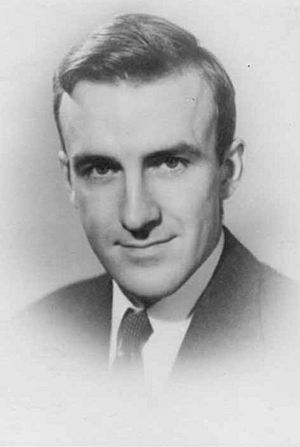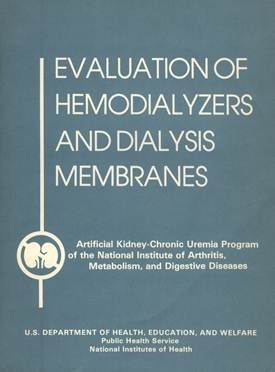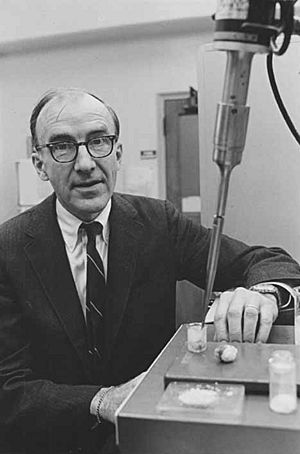Edward Wilson Merrill facts for kids
Quick facts for kids
Edward Wilson Merrill
|
|
|---|---|
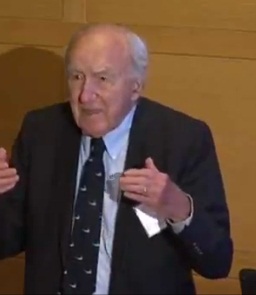
Edward Wilson Merrill
|
|
| Born | August 31, 1923 New Bedford, Massachusetts, U.S.
|
| Died | August 6, 2020 (aged 96) Belmont, Massachusetts, U.S.
|
| Nationality | American |
| Known for | Biomaterials, Artificial Kidney, Blood Rheology |
| Awards | Institute of Medicine of the National Academies (2014), National Academy of Engineering (2013), American Academy of Arts and Sciences (1966), Pierre Galletti Award (AIMBE, 2010), 100 Chemical Engineers of the Modern Era (AIChE, 2008), Founders Award (AIChE, 2000), Founders Award (SFB, 2002), Alpha Chi Sigma Award for Research Contributions (AIChE, 1982), C.A. Stine Materials and Engineering Award (AIChE, 1993), Clemson Award for Contributions to the Biomaterials Literature, (SFB, 1990) |
| Scientific career | |
| Fields | Chemical Engineering, Biomedical Engineering, Biomaterials, Biocompatibility, Blood Rheology, Artificial kidney, Hydrogels |
| Institutions | Massachusetts Institute of Technology |
| Doctoral advisor | Hermann P. Meissner (1907-1990) |
Edward Wilson Merrill (August 31, 1923 – August 6, 2020) was an American scientist. He was a pioneer in the field of biomaterials. These are special materials used in medical devices that work well with the human body. He also helped start the field of biomedical engineering, which uses engineering ideas to solve health problems.
Edward Merrill was born in New Bedford, Massachusetts. His father, Edward Clifton Merrill, was also a chemical engineer.
Contents
Becoming a Scientist: Education and Early Work
Edward Merrill grew up in Boston. He went to Roxbury Latin High School. Later, he studied chemistry at Harvard. He earned his bachelor's degree in 1944.
He then went to the Massachusetts Institute of Technology (MIT). There, he earned his PhD in 1947. His research focused on how two different polymers stick together. Polymers are large molecules made of many repeating units.
After finishing his studies, Merrill worked for a company called Dewey and Almy. In 1950, he joined MIT as a professor. He taught chemical engineering. He became a very important professor there. He also worked as a consultant for several hospitals in Boston.
Amazing Discoveries: Merrill's Research
Professor Edward Merrill worked for over 60 years. He made many important discoveries in bioengineering.
Understanding Blood Flow
In the 1950s and 1960s, Merrill was a top scientist in hemorheology. This is the study of how blood flows. He looked at how different parts of blood affect its thickness and movement.
Developing Artificial Kidneys
In the 1960s and 1970s, Merrill helped create the artificial kidney. This device helps people whose kidneys don't work well. He studied how these devices could best clean blood. His work led to the first guidelines for artificial kidneys in the U.S.
New Materials for Medicine
Merrill also worked on biomaterials. These are materials used inside the body.
- He helped develop hydrogels. These are soft, water-filled materials.
- He found ways to make materials that prevent blood clots. This is important for medical devices that touch blood.
- He and his colleague Ed Saltzman suggested using a material called poly(ethylene oxide) (PEO). This material is very safe to use in the body. Today, PEO is used in many medical systems.
- In the 1990s, Merrill helped create a special type of high-density polyethylene (HDPE). This material is now used for artificial joints, like in hip or knee replacements.
Other Important Inventions
Merrill also invented special contact lenses in 1973. These lenses allowed more oxygen to reach the eye. This made contact lenses much more comfortable and safer.
Teaching and Inspiring Others
Edward Merrill was also a legendary teacher. He taught many students who became leaders in science.
Pioneering Biomedical Education
In 1963, he started a new course at MIT. It was called "Chemical Engineering in Medicine and Biology." This course helped create the field of biomedical engineering.
A Huge Academic Family
Merrill taught 57 PhD students and 62 master's students. Many of his students became professors or leaders in companies. His "academic tree" includes about 3,600 scientists and engineers. This includes 675 professors around the world!
Many of his students and their students have won major awards. They have also become members of important scientific groups. These include the National Academy of Engineering and the National Academy of Medicine.
Awards and Honors
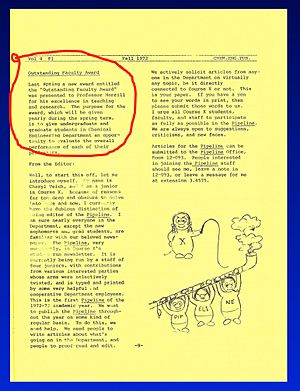
Edward Merrill received many awards for his work:
- He was elected to the National Academy of Engineering.
- He was also a member of the Institute of Medicine of the National Academies.
- The American Institute of Chemical Engineers named him one of the "100 Eminent Chemical Engineers of the Modern Era" in 2008.
- He received the Pierre Galetti Award in 2010. This is the highest award in bioengineering.
- He won several teaching awards at MIT.
Merrill also helped with other organizations. He was a consultant for the Museum of Fine Arts, Boston. He also helped with the Boston-Strasbourg Sister City Association.
 | Frances Mary Albrier |
 | Whitney Young |
 | Muhammad Ali |


